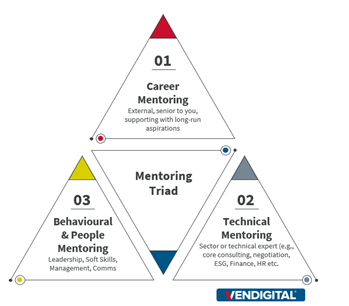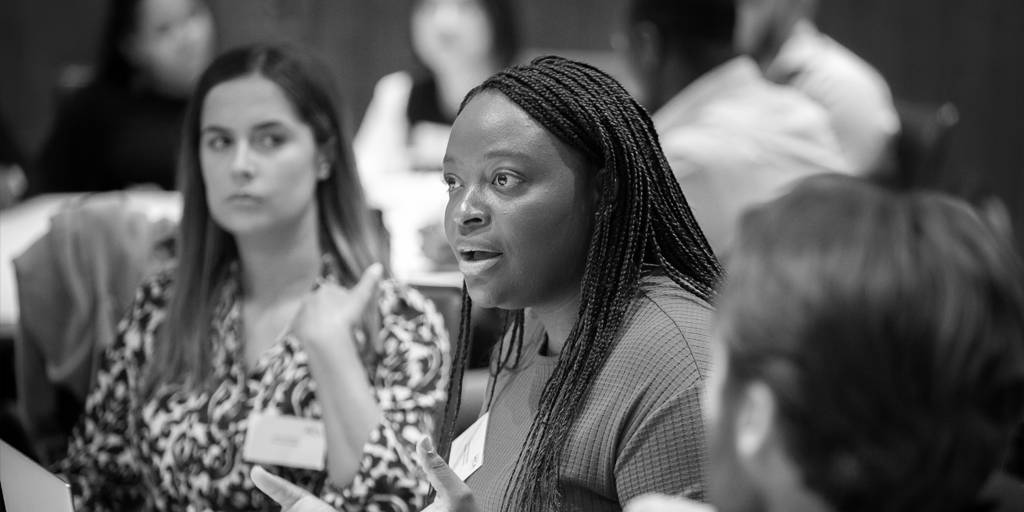The Young MCA recently hosted an event on making the most out of mentoring. We heard from young consultants who shared different experiences of their mentoring journeys from getting started, to how to be a mentor yourself. You can read a short write up below:

Andy Roderick, Vendigital – How to Get Started:
When thinking about mentoring as a mentee (a potentially daunting, wide-ranging subject-matter), the Mentoring Triad is a useful structure to break it down into manageable pieces:

The triad, or triangle of mentor types are:
- Career
- Technical
- Behavioural & People
These 3 different types of mentors all deliver the same function – someone that you can lean on to guide you through decisions and receive great advice, founded on trust, and having fun along the way.
How to actually pick a mentor?
Start out be defining your goals and specific needs (ensuring they’re SMART). You could then imagine what the ideal profile & type of mentor that would be to help you realise that goal or navigate that challenge. If you are starting out on your mentoring journey, this will probably feel quite daunting, so prioritise! Of the 3 different types of mentors, identify the type that will help you achieve your prioritised goals first, and focus your efforts here first. This will help you articulate your ‘ask’ to a prospective mentor too – a clear, compelling, and concise message as to why you would like them to be your mentor.
How to approach someone to be your mentor?
Make the ask (and keep it simple) … Depending on the source of the mentor, and particularly if you don’t have an existing relationship, you want to keep it simple. One of the upsides of this hybrid world is that it has helped, to an extent, democratise some forms of mentoring, allowing you to engage a larger pool of would-be mentors online.
My first brush with mentoring was with a personal connection, a senior executive in the hospitality industry, who remains my career mentor. Making the initial ask can feel as nerve-racking as that first client pitch, or job interview… but always remind yourself that the worst thing that might happen is they say no (though, very rare from my and others’ experiences!)
One of my professional, soft skill-related goals was to become a stronger verbal communicator, and so I approached our best ‘storyteller’ in Vendigital and asked this Director if they’d be willing to be a Behavioural & People mentor – again they fortunately said yes!
My key takeaway from mentoring:
Mentors can go into their ‘memory banks’, with their wealth of experience and knowledge and share with you those learnings, advise etc.. With this, a mentor can help short-circuit the learning and failing process, coaching you through major decisions, challenges or skill development along your career path.

Krupa Dodhia, EY – How to be a Good Mentor
Being a mentor requires you to embrace the fundamental components of communication: empathy, active listening and humanity. I’ve had the fortune of mentoring graduates here at EY and my focus for them has always been their wellbeing. I have been on the other end of the “so, where do you want to be in ten years time?” conversation as a graduate and responding with “I just want to get through the day!”.
Now that’s not to say that long term career talk is not important; positive ambition should be instilled in all mentees, regardless of where they are in their career. However, bringing it down a level and forging a relationship established on these fundamentals will only strengthen whatever is to come.
All of this is dependent on the important aspect of comfort. A mentor mentee relationship shouldn’t feel like a burden. It should be moulded around the needs of all those involved. The best piece of advice I have ever received was to always ask the following question as a mentor: “do you wat to rant, get advice or want coaching?”.
Finally, it’s important to be as transparent as possible. Moving forward from a foundation built on trust and mutual understanding is the essence of what mentoring is. There is no one size fits all approach to mentoring, so it takes the work of both parties to turn it into something great.

